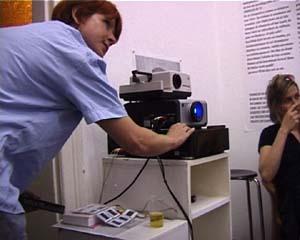Consequences of summer
dal 21/7/2003 al 22/7/2003
Segnalato da
21/7/2003
Consequences of summer
Sparwasser HQ, Berlin
Dialogues on artistic production and contemporary cultures. Simon Starling and Michael Stevenson will be in Sparwasser HQ to show and discuss their recent projects, which we will be able to view in the context of their earlier works.

dialogues on artistic production and contemporary cultures
June 1 -August 31: on Tuesdays at 8 pm.
(the other days of the week Sparwasser HQ will be closed)
Sparwasser HQ invites you to our next dialogue
Tuesday the 22nd of July at 8 pm.
Simon Starling and Michael Stevenson.
Simon Starling and Michael Stevenson will be in Sparwasser HQ to show
and discuss their recent projects,
which we will be able to view in the context of their earlier works.
Simon Starling
I am happy with the idea that my practice functions as a kind of
parallel universe,
perhaps operating in the realm of the out-moded or obsolete. Holding
up a mirror to a contemporary reality. Investigating the roots of
contemporary issues rather than the issues themselves. For example
two projects from last year perhaps have an interesting relationship
to contemporary ideas on
globalisation but they look to earlier manifestations of this phenomena.
'Flaga (1972-2000)' involved looking at the history of the production
of the Fiat 126 in
Italy and Poland. This car was produced under two very different
regimes over an exceptionally long period of time for a car. The
small red 126 that I bought in Italy and drove to Poland would still
fit body parts manufactured in 2000 in Bielsku-Bialej.
And 'Kakteenhaus', made at Portikus in Frankfurt, investigated the
phenomena of the increasingly large Tabernas Desert in Andalucia, via
the introduction of cacti into the region as props for the production
of Spaghetti Westerns in the late 1960's.
I guess these objects and ideas are reinvigorated to serve as
investigative tools for understanding today.
I engage with these ideas on a very human level. It's not polemical
in any way. Both 'Kakteenhaus' and 'Flaga (1972-2000)' are
essentially works about the flow of energy
around the world, and that is really fundamental to what I doing.
Michael Stevenson
Representing New Zealand at the Venice Biennale, the Trekka, the only
ever 'home-grown' car becomes
a complex metaphor for national identity. Cultural aspirations are
placed side by side with the belated production of a motor car.
Designed as a simple agricultural utility vehicle, the Trekka and its
peculiar production scheme are closely linked to the protectionist
trade policies that characterised New Zealand in the 1960s.
The whole concept of this unusual car was to fill a niche in the then
tightly regulated New Zealand economy. The Trekka was in fact based
on a chassis and motor sourced from the Czechoslovakian car
manufacturer Skoda. 'Free Western enterprise' bartering with a
Communist Bloc country at the peak of the Cold War is but one of the
anomalies the Trekka's story highlights.
New Zealand anticipated a leading role for itself in the event of
cold war end game, it would be the island of survival, the only first
world country to remain completely untouched. Government planning,
which at the time favoured self-sufficiency and import substitution
overlapped with such thinking.
Next talk is on Tuesday July the 29th at 8 pm
with Oliver Zwink and Julika Gittner.
S P A R W A S S E R H Q
OFFENSIVE FOR CONTEMPORARY ART AND COMMUNICATION
T O R S T R A S S E 1 6 1 , 1 0 1 1 5 B E R L I N
OPENING HOURS: WED-FRI 4 -7 PM, SAT 2 - 6 PM



